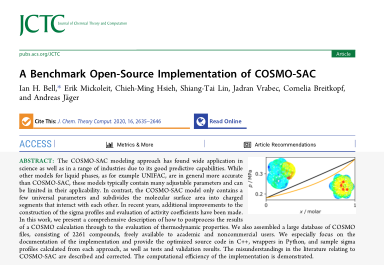Predictive modeling for drug-polymer compatibility in pharmaceutical formulations using COSMO-SAC.
Project description
COSMOPharm
Welcome to the COSMOPharm package, accompanying our paper in J. Chem. Theory Comput.. This project and its associated publication offer insights and a practical toolkit for researching drug-polymer and drug-solvent systems, aiming to provide the scientific community with the means to reproduce our findings and further the development of COSMO-SAC-based models.

About
COSMOPharm is a Python package designed for predictive modeling of drug-polymer compatibility and drug-solubility in common solvents. It leverages the COSMO-SAC (Conductor-like Screening Model Segment Activity Coefficient) model, offering a robust platform for solubility, miscibility, and phase behavior prediction in drug formulation processes.
Features
- Compatibility Prediction: Predict drug-polymer compatibility using the open-source COSMO-SAC model.
- Solubility Calculation: Guide polymer selection for drug formulations by calculating drug-polymer solubilities.
- Miscibility and Phase Behavior Analysis: Understand drug-polymer miscibility and phase behavior under various conditions.
- User-friendly Interface: Facilitate research with easy-to-use functions and comprehensive documentation.
Installation
Install COSMOPharm with pip:
pip install cosmopharm
Ensure you have installed the cCOSMO library as per instructions on the COSMOSAC GitHub page.
Quick Start
This minimal example demonstrates how to use COSMOPharm to calculate solubility and miscibility of a drug with a polymer:
import cCOSMO
from cosmopharm import SLE, COSMOSAC
from cosmopharm.utils import create_components, read_params
# Define components - replace 'DrugName' and 'PolymerName' with your actual component names
names = ['DrugName', 'PolymerName']
params_file = "path/to/your/params.xlsx"
# Load parameters and create components
parameters = read_params(params_file)
components = create_components(names, parameters)
# Initialize COSMO-SAC model - replace paths with your local paths to COSMO profiles
db = cCOSMO.DelawareProfileDatabase(
"path/to/your/complist/complist.txt",
"path/to/your/profiles/")
for name in names:
iden = db.normalize_identifier(name)
db.add_profile(iden)
COSMO = cCOSMO.COSMO3(names, db)
# Setup the COSMO-SAC model with components
model = COSMOSAC(COSMO, components=components)
# Calculate solubility (SLE)
sle = SLE(solute=components[0], solvent=components[1], actmodel=model)
solubility = sle.solubility(mix='real')
# Output the solubility
print(solubility[['T', 'w', 'x']].to_string(index=False))
Replace 'DrugName', 'PolymerName', and file paths with your actual data and files. This example provides a straightforward demonstration of calculating the real solubility of a drug in a polymer using COSMOPharm.
Contributing
Contributions are welcome! Please refer to our GitHub repository for more information.
Citation
If you use COSMOPharm in your research, kindly cite our work. Citation details are available in CITATION.md.
License
COSMOPharm is released under the MIT License. For more details, see the LICENSE file.
Project details
Release history Release notifications | RSS feed
Download files
Download the file for your platform. If you're not sure which to choose, learn more about installing packages.
Source Distribution
Built Distribution
Hashes for cosmopharm-0.0.23.1-py3-none-any.whl
| Algorithm | Hash digest | |
|---|---|---|
| SHA256 | 2135d2563c4ba39aa36da5cea2cf250196a86ac81bb5a0a04488003562db52ef |
|
| MD5 | 64277a1c15e973a0c8b5a6583be09a54 |
|
| BLAKE2b-256 | dcb666d59454c13142bc2a892d074f1e60b282f94e8c05a934f230f61417b6c2 |











